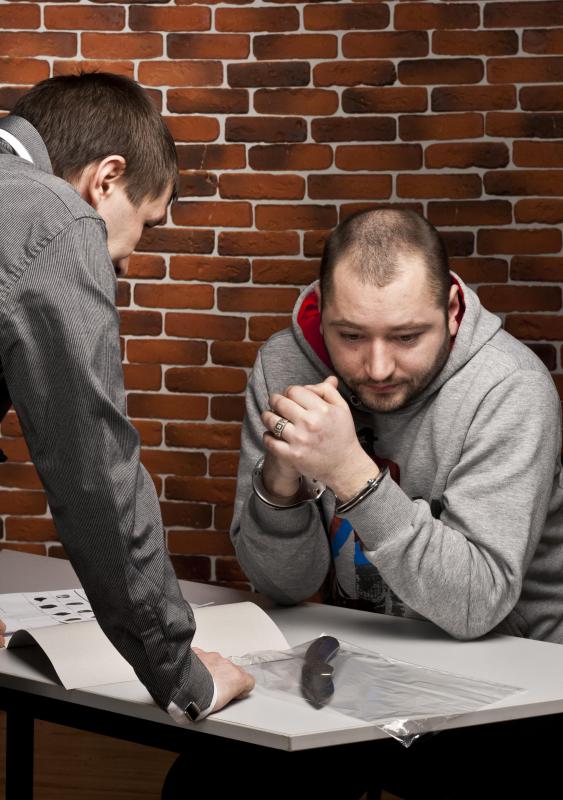At WiseGEEK, we're committed to delivering accurate, trustworthy information. Our expert-authored content is rigorously fact-checked and sourced from credible authorities. Discover how we uphold the highest standards in providing you with reliable knowledge.
What is Self-Incrimination?
When people are accused of a crime, it is often someone else or some other agency that has made the accusation. In most cases, people don’t willingly accuse themselves of a crime or say things that would make others think they were criminally responsible, called self-incrimination. When a person does self-incriminate, he does accuse himself. This term is often used in the context of taking the Fifth Amendment or refusing to speak to avoid self-accusation.
The US Fifth Amendment is a right whereby in most cases people can refuse to testify if testimony results in self-incrimination. By law, people do have to bear witness against oneself; they can refrain from speaking, again, most of the time, if what they have to say could result in criminal charges against them. This becomes particularly useful when people are asked to give testimony against another that might reveal their own illegal activities; instead they answer that they refuse to speak on the grounds it may incriminate them, or they may simply state that they take the Fifth.

There are several methods to obtain testimony from someone worried about self-incrimination. A prosecuting attorney might be able to create a plea bargain for the person testifying. In this bargain, admitting to the crime committed would not result in prosecution or would result in reduced charges.
In the first instance this is called granting immunity. A firm offer of immunity could allay the concerns of a witness that his testimony is self-incrimination. He might then admit to a crime in open court without concern regarding charges. It should be noted this immunity offer should be approved by the witness’ lawyer; much weaker offers might be made that would still cause the witness to self-incriminate and might result in criminal charges.

Someone on trial may also commit self-incrimination, either through direct admission of guilt and a filing of a guilty plea, or in questioning in court. In many circumstances a person who is accused does not have testify, and may be advised by lawyers not to. This is a common question in movies, TV and books with legal themes: if the defendant testifies will he accidentally or purposefully self-incriminate?

Another instance in which people might practice self-incrimination is while they are under arrest or in the custody of law officials. People are given the right to be silent and told that whatever they say “can and will” be used against them in court. Despite prodigious advice by lawyers to fully claim this right to silence, many people do talk and may end up implicating themselves in a crime with their statements. It isn’t completely clear what statements of guilt and innocence are during police questioning, but people should be fully aware that just about anything they say may be turned into an accusation of oneself.
AS FEATURED ON:
AS FEATURED ON:














Discussion Comments
Should a person who is being accused of raping a child, plead the fifth when they are being asked yes or no questions? For instance, "Have you ever penetrated the victim?"
My opinion, I think by pleading the fifth on a question that simple is basically showing that they are guilty of penetrating the victim. So, is there anyone out there who can help me to understand if this is any better or if I am misjudging in a situation like this. Please help me! Thanks!
Post your comments